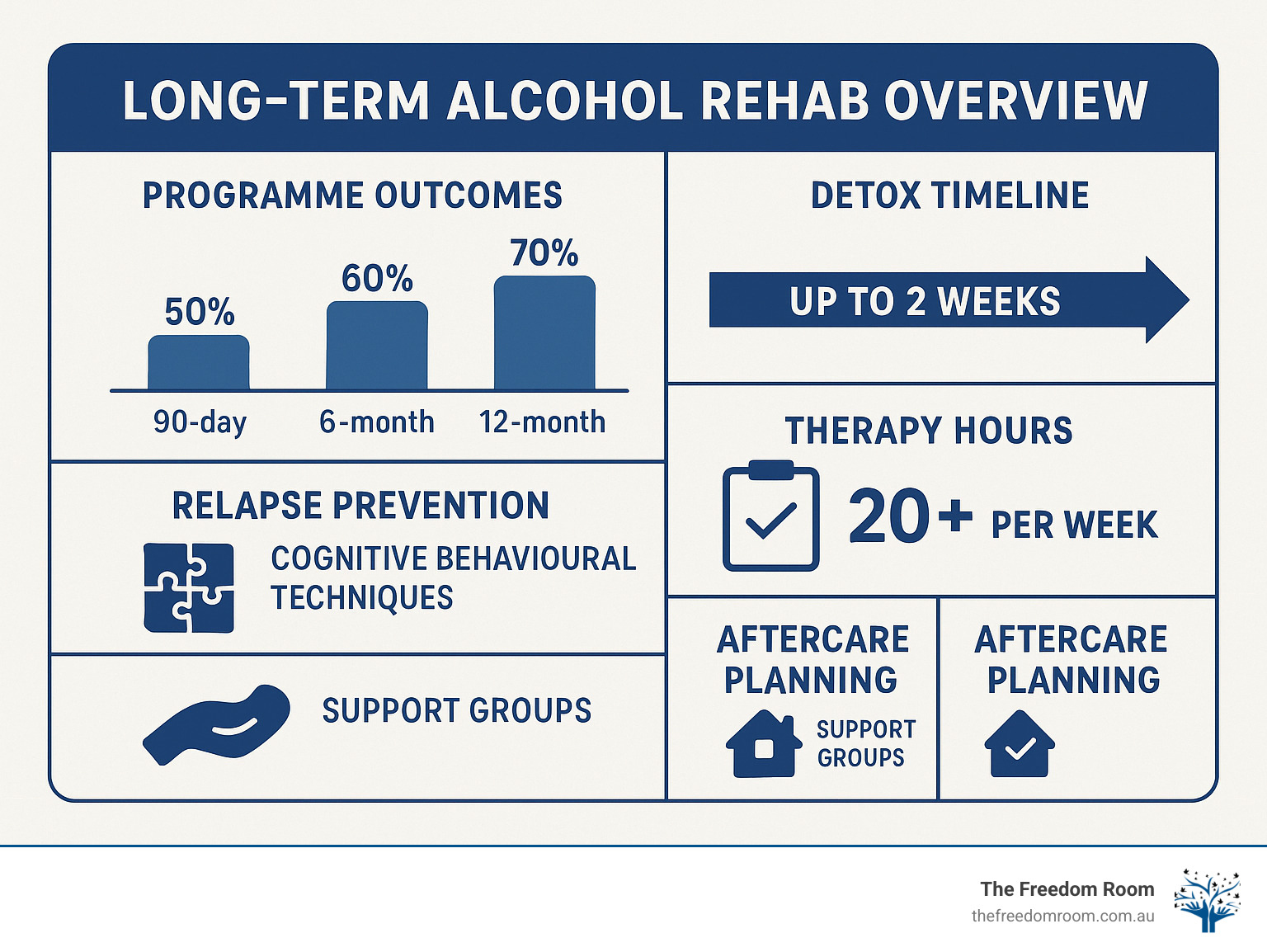Long Term Alcohol Rehab: 7 Powerful Benefits in 2025
Why Long Term Alcohol Rehab Changes Everything
Long-term programmes running for ninety days or more consistently beat the results of the traditional thirty-day stay. Extra time gives your brain space to heal, lets you practise new coping skills, and dramatically reduces relapse risk.
Quick facts:
- Typical duration: three to six months (some stay up to two years)
- Outcomes: studies show more than eighty per cent reduction in problematic alcohol use after ninety days
- Average cost (New York example): about fifty-six thousand dollars for thirteen weeks, with many clients using insurance or Medicaid
- Best suited for: people with several relapses, severe dependence, or co-occurring mental health concerns
Detox can absorb the first one to two weeks of any admission, leaving very little therapeutic time in a month-long stay. Long-term rehab fixes that by combining medical supervision, structured therapy, and ongoing peer support so you can address not only drinking but the underlying issues driving it.

Understanding Long-Term Alcohol Rehab
Put simply, long term alcohol rehab refers to any residential programme lasting a minimum of ninety days. The National Institute on Drug Abuse recommends this time frame because decades of data show it produces far better outcomes than shorter stays.
Many centres use a therapeutic-community model, where residents live, learn, and recover together rather than passively receiving treatment. You become part of a supportive micro-society that reinforces sober living every day.
Why Extra Time Matters
Alcohol reshapes the brain’s reward circuitry. Restoring that circuitry takes more than a few weeks. Longer programmes allow for continuous abstinence, the gradual easing of post-acute withdrawal symptoms, and enough repetition for new habits to stick.
Drug Abuse Treatment Outcome Studies found that people who completed six-month programmes reported an eighty-plus per cent drop in cocaine use and nearly a ninety per cent drop in problematic drinking. Shorter stays rarely match those numbers.
Key Goals
- Practise sobriety skills in real-world situations while still in a safe setting.
- Restore physical health through nutrition, medical care, and exercise.
- Build life skills—job readiness, budgeting, relationship communication—that addiction may have stalled.
Who Benefits from Extended Care?
Longer treatment isn’t for everyone, but it can be life-changing if you:
- Have a long history of heavy drinking
- Have tried thirty-day programmes and relapsed
- Live with depression, anxiety, PTSD, or another mental health diagnosis
- Use multiple substances besides alcohol
Candidate Checklist
If two or more of these apply, long-term care deserves serious consideration:
- Years of daily or binge drinking
- Previous detoxes or rehab attempts without sustained sobriety
- Mental health or medical complications
- Limited stable housing or support network
Special Populations
- Young adults—brains are still developing, so extended structure helps
- Older adults—slower metabolism and complex health needs benefit from extra monitoring
- Parents—some facilities allow children on-site, reducing family separation stress
- Gender-specific groups—address trauma, social pressures, and relationship dynamics more safely
Core Stages of a Long-Term Programme

Every quality programme follows a clear path:
- Assessment and safe detox
- Intensive residential therapy
- Gradual step-down or day treatment
- Individualised aftercare plan
Assessment & Detox
A full medical and psychosocial assessment shapes your personal care plan. Professional detox generally lasts three to ten days and includes twenty-four-hour nursing because alcohol withdrawal can be dangerous.
Intensive Residential Phase
The bulk of your stay blends evidence-based therapies—CBT, ACT, group process—plus nutrition, exercise, and vocational workshops. Enough weeks are built in for you to practise new coping strategies again and again until they’re second nature.
Transition & Aftercare Planning
As you progress, you’ll move to less supervised housing or day programmes while still attending therapy. Before discharge, the team helps arrange ongoing counselling, peer meetings, and relapse-prevention tools so support continues at home.
Therapies & Services You’ll Encounter

Evidence-Based Clinical Therapies
- Cognitive Behavioural Therapy: identify triggers and change thinking patterns over twelve-plus weeks.
- Dual-diagnosis care: simultaneous treatment of mental health conditions.
- Mindfulness approaches: learn to pause between urge and action.
- Twelve-Step Facilitation: understand how peer support groups work (including secular options).
Holistic & Skill-Building Supports
Exercise, art or music therapy, nutrition education, and financial-literacy classes reinforce whole-of-life recovery. More info about Holistic Approach to Addiction
Family Engagement
Workshops teach relatives about boundaries and codependency, creating a healthier home environment when you leave rehab.
Costs, Funding & Locating Programmes
Understanding the Price Tag
A thirteen-week residential stay in New York averages about fifty-six thousand dollars before insurance. That number drops sharply once sliding-scale fees, payment plans, and insurance contributions are applied. Cost insights show that extended care often delivers better value per day than repeated short stays.
Insurance & Government Assistance
The Affordable Care Act lists substance-use treatment as an essential health benefit, so most private policies, Medicare, and state programmes pay a significant share. Always verify your benefits before ruling out treatment.
Finding Facilities Near You
Use the free SAMHSA locator or speak with The Freedom Room for guidance. More info about Alcohol Addiction Treatment Centers explains what to look for when comparing centres.
Relapse Prevention, Aftercare & Ongoing Support

Leaving rehab is only the beginning. A solid relapse-prevention plan identifies personal triggers, early warning signs, and proven coping strategies. Daily routines, accountability partners, and regular peer meetings provide structure and ongoing motivation.
Community matters: support groups such as AA, SMART Recovery, or secular alternatives offer shared experience and guidance. Volunteering or creative pursuits can add purpose and strengthen your commitment to sobriety.
More info about Relapse Prevention Strategies
Frequently Asked Questions about Long Term Alcohol Rehab
How long does long term alcohol rehab actually last?
When people ask about long term alcohol rehab duration, they’re often surprised to learn there’s no one-size-fits-all answer. These programmes typically run anywhere from 90 days to two years, though most people find their sweet spot somewhere between three to six months.
The 90-day minimum isn’t just a random number – it’s backed by solid research from NIDA showing that people who stay in treatment for at least this long have dramatically better outcomes. But here’s the thing: your brain doesn’t follow a calendar. Some people need six months, others benefit from a full year, especially if you’re dealing with severe addiction, multiple relapses, or complex mental health issues alongside your drinking.
Many quality programmes offer flexible durations based on your individual progress. If you’re thriving at the 90-day mark but still feel wobbly about certain triggers, staying longer isn’t failure – it’s wisdom.
Can I afford a six-month or one-year programme?
Let’s be honest – when you first hear about long term alcohol rehab, the financial aspect can feel overwhelming. But before you write it off as impossible, let’s look at the reality of funding options available to you.
Most health insurance plans now cover substance abuse treatment as an essential benefit. Many plans cover between 80-100% of costs, particularly through Medicaid or state programmes. The days of insurance companies refusing addiction treatment are largely behind us, thanks to legislative changes that recognise addiction as a medical condition.
If insurance doesn’t cover everything, don’t panic. Many facilities offer payment plans that spread costs over manageable monthly amounts, sliding scale fees based on your income, and scholarship programmes for people facing financial hardship. Some programmes even offer work-study options where you contribute labour around the facility in exchange for reduced fees.
Most treatment facilities employ financial counsellors whose entire job is helping people find ways to afford care. Don’t let money fears stop you from making that initial phone call – you might be surprised by the options available.
What should I pack and expect on my first day?
Walking into long term alcohol rehab for the first time feels a bit like starting at a new school, moving house, and beginning a new job all rolled into one. It’s completely normal to feel nervous, excited, or downright terrified.
Most programmes will send you a detailed packing list once you’re admitted, but generally you’ll need comfortable clothing for various activities (think yoga pants and walking shoes rather than formal wear), personal hygiene items, any prescribed medications in their original bottles, and important documents like identification and insurance cards.
Your first day typically starts with a thorough medical assessment to ensure you’re stable and ready for programming. You’ll meet your treatment team, receive orientation about daily schedules and facility rules, and probably feel slightly overwhelmed by all the new information.
Expect to feel a mixture of emotions – relief at finally getting help, anxiety about the unknown, maybe some regret or second-guessing your decision. These feelings are completely normal and usually settle within the first few days as you adjust to the routine.
Ready for Change? Let’s Build a Stronger, Alcohol-Free Future Together
At The Freedom Room, we understand that choosing long term alcohol rehab represents both courage and wisdom. Our team brings unique authenticity to your recovery journey because we’ve walked the same path. Our counsellors, facilitators, and workshop leaders are all in recovery themselves, providing genuine empathy and understanding that only comes from lived experience.
We recognise that recovery isn’t just about stopping drinking – it’s about building a fulfilling life that doesn’t require alcohol as a crutch. Our comprehensive approach includes personalised one-on-one sessions, dynamic workshops, group recovery meetings, and family involvement sessions designed to address the root causes of addiction.
Our services complement long term alcohol rehab programmes by providing crucial pre-rehabilitation support to help you choose the right facility, and essential post-rehabilitation support to maintain your sobriety after returning home. We understand that addiction must be faced daily, and recovery is a journey rather than a destination.
What sets us apart is our understanding that life doesn’t stop when you get clean and sober. Our counselling and workshops address stress, anxiety, and depression – feelings often associated with addiction. We’re not just professionals; we’re friends on your journey to sobriety, ready to steer the twists and turns together.
Whether you’re considering long-term residential treatment or supporting someone through their recovery journey, we’re here to provide compassionate, cost-effective support custom to your unique needs. More info about Addiction Recovery outlines our comprehensive approach to lasting sobriety.
Recovery isn’t a solo mission – it’s a collective effort fuelled by shared stories and unwavering camaraderie. Together, we’ll build the foundation for a stronger, alcohol-free future.
Support & Resources
If you or someone you know is living with alcohol dependence, professional help is available.
- Contact The Freedom Room through the form at https://thefreedomroom.com.au/contact/ or visit our Strathpine centre for confidential guidance.
- In an emergency, call local emergency services immediately.
- Peer support is offered by Alcoholics Anonymous (https://aa.org.au) and Al-Anon Family Groups (https://www.al-anon.org.au).
- Lifeline (https://lifeline.org.au) provides twenty-four-hour crisis counselling.
Taking the first step toward recovery is an act of courage. Reach out, stay connected, and remember that help is always within reach.


